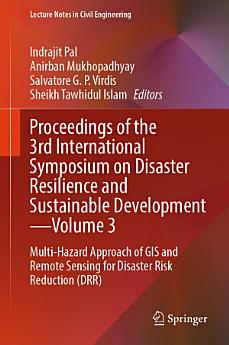Proceedings of the 3rd International Symposium on Disaster Resilience and Sustainable Development—Volume 3: Multi-Hazard Approach of GIS and Remote Sensing for Disaster Risk Reduction (DRR)
About this ebook
This book represents Volume 3 of a three-volume book series.
About the author
Dr. Indrajit Pal is an associate professor in the Disaster Preparedness, Mitigation, and Management (DPMM) Academic program at Asian Institute of Technology, Thailand, and has more than 21 years of experience in research, teaching, training, advocacy, consultancy primarily focused on disaster risk governance, incident command system, hazard and risk assessment, CBDRM, public health risk, disaster resilience, and DRR Education. Dr. Pal served as faculty member at Centre for Disaster Management at Lal Bahadur Shastri National Academy of Administration, Mussoorie, India. Dr. Indrajit is a former member of Board of Directors for the Global Alliance of Disaster Research Institutes (GADRI), Japan. Dr. Pal authored a number of peer-reviewed journal papers, conference paper, and books (Springer, Elsevier and SAGE). Some of his ongoing research includes Risk Characterization in Asian Delta communities in "Living Deltas Hub" project UKRI, GCRF.
Dr. Anirban Mukhopadhyay is an affiliated faculty and senior researcher at Disaster Preparedness, Mitigation, and Management (DPMM), Asian Institute of Technology (AIT), Thailand. Dr. Mukhopadhyay is an expert on Geospatial and environmental modeling. He has several research experiences in deltas, coasts, mangroves, and sea ice all over the world. His research area includes applications of geoinformatics as well as hydrodynamic modeling. Dr. Mukhopadhyay has published several books and over a hundred peer-reviewed journal articles.
Dr. Salvatore G.P. Virdis is an associate professor at the Asian Institute of Technology (AIT), Thailand. His formal background is in applied geological sciences and remote sensing. Dr. Virdis recent and current research interests center upon geo-information and Earth Observation science to assess and evaluate present and future changes of anthropogenic origin as well as their effects on natural and non-natural physical/human environment. He uses integrated field-based, remote/proximal sensing techniques, and advanced geospatial and machine learning modeling on a variety of spatial and temporal scales, ranging from seasonal to decadal processes. He has several publications in high impact factor international journals and more than 20 years of teaching experience.
Sheikh Tawhidul Islam is a professor and director of the Institute of Remote Sensing and GIS, based in one of the public universities of Bangladesh—Jahangirnagar University (www.tawhidulislam.com). Dr. Islam received his Ph.D. Degree from the Department of Geography, Durham University, UK (2002–2006) under the British Commonwealth Scholarship Programme. He produced more than 100 academic and professional works during the last 20 years among which more than 50 works were published in peer-reviewed academic journals and the remaining, more than 70 professional research works were carried out for a number of international and national agencies. Dr. Islam has been working in the interface between man and nature and uses both quantitative (e.g., geospatial techniques, science/data) and qualitative methods (e.g., different conceptual frameworks, social theories) to examine and better understand the societal, environmental problems in a changing climatic context. His writings help to navigate the complexities of vulnerabilities of people caused from environmental degradation, climate and disaster impacts, social injustice of various kinds. He looks at the problems within the contextual settings, in a connected manner and uses systems thinking approach to do the assessments. Apart from his position at Jahangirnagar University, he also works as the senior research fellow, Institute for Water Environment and Health, United Nations University, Hamilton, Canada.











